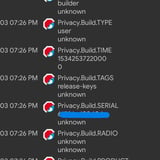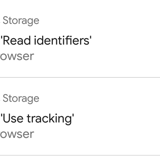tl:dr;
Tracking can be done by an app without showing ads. By merely blocking ads you are not preventing tracking
Hosts based ad blocking is better than browser ad blocking, since it does not reveal PII (Also see Izzy's comments) Browser based adblockers can track as shown, so it is a privacy risk
To prevent tracking , ad blocking needs to be in conjunction with other methods of plugging Privacy breach or PII breach. The only tool available is Xposed module XprivacyLua for Android 6.0 to 8.1. It is a successor of Xprivacy module that runs on earlier Android versions
I'd like to know if the usual ad blockers on Android do anything to prevent user tracking from ad modules
What is user tracking ? This needs to put in context first. It can be anything that fingerprints an user for instance (Also, see this article from Izzy's blog
Network Information
WiFi you are connected to (SSID)
Country network identifier, telecom operator you are connected to,
Device Information
Device information – Build Properties
Device build user, build type, build time, build tags, build serial, build radio, build manufacturer, build ID
Advertising Client ID
Google Services Framework (GSF) ID
In case of web browsing more information – see Browser leaks and Webkay
Analytics (Fabric/Crashlytics, Facebook app events, Firebase Analytics, Google Analytic, Mixpanel, Segment)
This list is illustrative and not exhaustive . For instance, SIM information, IMEI information, Sensors on the device etc may also be used. For more details on other privacy elements see XprivacyLua Github
Now, coming to specifics in your question . As you rightly surmised Hosts file based ad blockers just do that, block access to listed domains and are more effective than browser based adblockers as you can see from iBug’s answer and Izzy’s comments
So if your primary aim is to block ads is the way to go compared to browser based plugins, which may leak PII information (It does leak in the case of Ad Block Plus, haven't tested others)
But the question to be asked is Am I stopping being tracked? for which the answer is emphatic NO , unless you use tools in addition to prevent privacy breach and this is where XprivacyLua comes in
If I use Ad Block Plus (with no whitelist), AdAway, uBlock Origin within Firefox, or other popular ad blockers, do these do anything for the ad modules in the OS/APK from sending private data to the ad networks and/or app developer?
NO, in the case of Adblock plus
I am not discussing the relative merits partly because I haven’t used them all and partly because it is secondary to the thrust of my answer. However, I installed Ad Block Plus and restricted exposure of elements that facilitate fingerprinting, as an example
Screenshot below shows the actual values and the values exposed to the outside world to prevent breach. For instance the first shows the operator information as 40445 (no secret here) and what is revealed is 00101 and the last shows while I am using a Xiaomi device , make is not revealed ( I have chosen specific portions of log (needs Pro version) which anyway don't reveal too much). So Adblock plus is revealing all your build properties!

(Click to enlarge)
In addition it is also revealing your Android ID, advertising ID, GSF ID as you can see from the notification

(Click to enlarge)
So, you set out to block ads and while doing that revealed information that can be used to fingerprint you :-(
To sum up you need a wholistic approach to guard your privacy and the best available for that is XprivacyLua
Please note that while this module is very powerful, it has certain limitations like restricting access only if the app uses Java Code and not native code or restricting tracking on browsing if Webview is used and not a browser like Chrome. That said, it’s the best weapon in the arsenal to protect privacy. In addition to the hooks (restrictions) provided by the developer others have contributed custom hooks and being open source you can write / modify your own hook. To top it, the developer is ever available and responsive on the XDA threads



/system/etc/hostsfile, and thus not "part of user tracking" (I use it myself). It doesn't check what hosts you connect to. So we need to differentiate here – as for AdblockPlus you might be right ;)